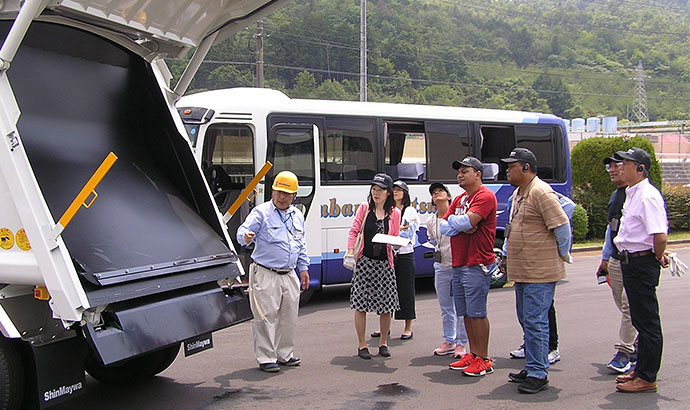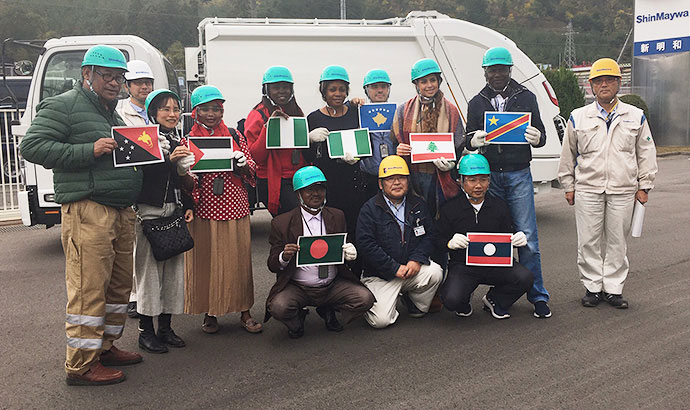環境保全活動
新明和グループでは、環境負荷低減を促進するため、CO2排出量やエネルギー使用量等を継続的に把握しています。
環境負荷低減・気候変動対策
地球温暖化防止に対しては、1980年代から化石燃料(天然資源)の有効利用を目的として、長年、工場を主体に取り組んできました。
その後、省エネ法改正により、2012年に“特定事業所”の指定を受けたことで、全社一体となり、一層の省エネに取り組んでいます。
また、2022年度からは、新たに「2030年度のCO2排出総量を38%削減※1」という目標を定め、この達成を志向した施策を実践しています。
- ※1当社のピーク値である2017年度に対して

2024年度の活動
2024年度は、流体製品の生産拠点である小野工場に新たに竣工した「大型水中ポンプ運転検査設備」の屋根に太陽光発電を設置し、そこで得た電力を活用することで、CO2排出量削減(52t-CO2/ 年)に寄与することが出来ました。また、環境投資として太陽光発電設備の導入およびCO2フリー電力の調達に関する全社的な制度整備に取り組みました。
その他、海外を含めた主要なグループ会社のCO2排出実績の管理を行い、連結でのScope1、2の実績把握が出来る体制を整えました。
廃棄物削減
新明和工業は3R(リデュース・リユース・リサイクル)に加え、リフューズ(ごみとなるものは受け取らない)を心掛け、廃棄物の削減およびリサイクル化に取り組んでいます。また、2022年度からは新たに「2030年度の廃棄物排出総量10%削減※2」および「再資源化率※399%以上」を目標に定め、循環型社会の実現に取り組んでいます。
- ※22020年度に対して
- ※3再資源化率=再資源化量÷廃棄物総発生量×100(%)

2024年度の活動
製造での更なる歩留まり改善に伴う材料の投入量・廃棄量の最小化および廃棄物の分別・仕分け徹底による有価物化の促進に取り組んでいます。
JICA課題別研修「固形廃棄物管理の基礎」に協力
当社グループではサステナビリティ経営方針に基づき、事業活動を通じて広く社会に貢献することを目指しており、2011年度からJICA(独立行政法人 国際協力機構)関西が主催する、課題別研修「固形廃棄物管理の基礎」に協力しています。
この研修は、JICAから事業を受託したNPO法人「こども環境活動支援協会(LEAF)」が、太平洋やアジア、中南米地域などの政府および自治体関係者を対象に、「民間セクターと市民社会との協働による固形廃棄物管理」について学ぶことを目的に、日本の地方自治体における廃棄物処理と循環型社会の構築、資源化物再生化事業等に関する講義や現地見学といったカリキュラムで構成されています。当社では広島工場にご案内し、午前中の「塵芥車メーカーの取り組み」の講義に続いて、午後からは「収集車の操作・修理研修」として製造現場の見学や実車を使って操作方法や安全な取り扱いに関する説明を行いました。本研修は、2020年度から2022年度まで新型コロナの影響で中止となっていましたが、 2023年度以降再開となり、2024年度は以下に記す国の方々が参加されました。
当社はこれからも積極的にJICA研修に協力することで、“塵芥車”を通じて、世界の廃棄物課題解決への貢献を目指します。
| 実施日 | 対象国 | 対象者 |
|---|---|---|
| 2024年9月3日 | カンボジア・エチオピア・レバノン・フィリピン・南スーダン・スーダン・バヌアツ | 7名 |
| 2024年12月5日 | ブータン・ボスニアヘルツェゴビナ・ブラジル・コソボ・マケドニア共和国・パプアニューギニア・セルビア・トルコ共和国・ウズベキスタン | 9名 |


水資源保護・水使用量の削減
限りある貴重な資源である水資源の節減は、浄水工程でのエネルギー削減にもつながることから、工場では、水の使用量および排水量の両面で適正管理を行っており、2024年度におきましても法規・条例不遵守はありませんでした。
当社は水使用量が限定的であることから水リスクは低いと評価していますが、気候変動や地域の水事情に配慮し、持続可能な水資源利用の効率化を促進していきます。今後も水使用量のモニタリングを継続し、地域社会との協調を重視した水管理を推進していきます。


汚染物質の排出量削減
工場から敷地外(大気・水域)に排出する物質については、法規・条例よりも厳しい自主規制値※4を設定し、環境負荷低減に努めています。
- ※4例 NOx 法規制値の30~70%程度BOD 法規制値の50%( 航空機事業部 甲南工場の事例)


化学物質の管理
当社は、化学物質の適正な管理に継続的に取り組んでおり、2024年度においても法令・条例に関する不遵守や違反は確認されておりません。
2024年度におけるフロン排出量は17.3t-CO2であり、冷媒機器の適切な維持管理を通じて、安定的な排出量の管理を実現しています。
また、PRTR制度に基づく対象物質については、排出量が116,300kg、移動量が12,863kgとなっており、いずれも適正に管理されています。
今後も、法令・条例の遵守を徹底するとともに、代替物質の導入や製造工程の見直しなどを通じて、環境負荷のさらなる低減に努めていきます。
